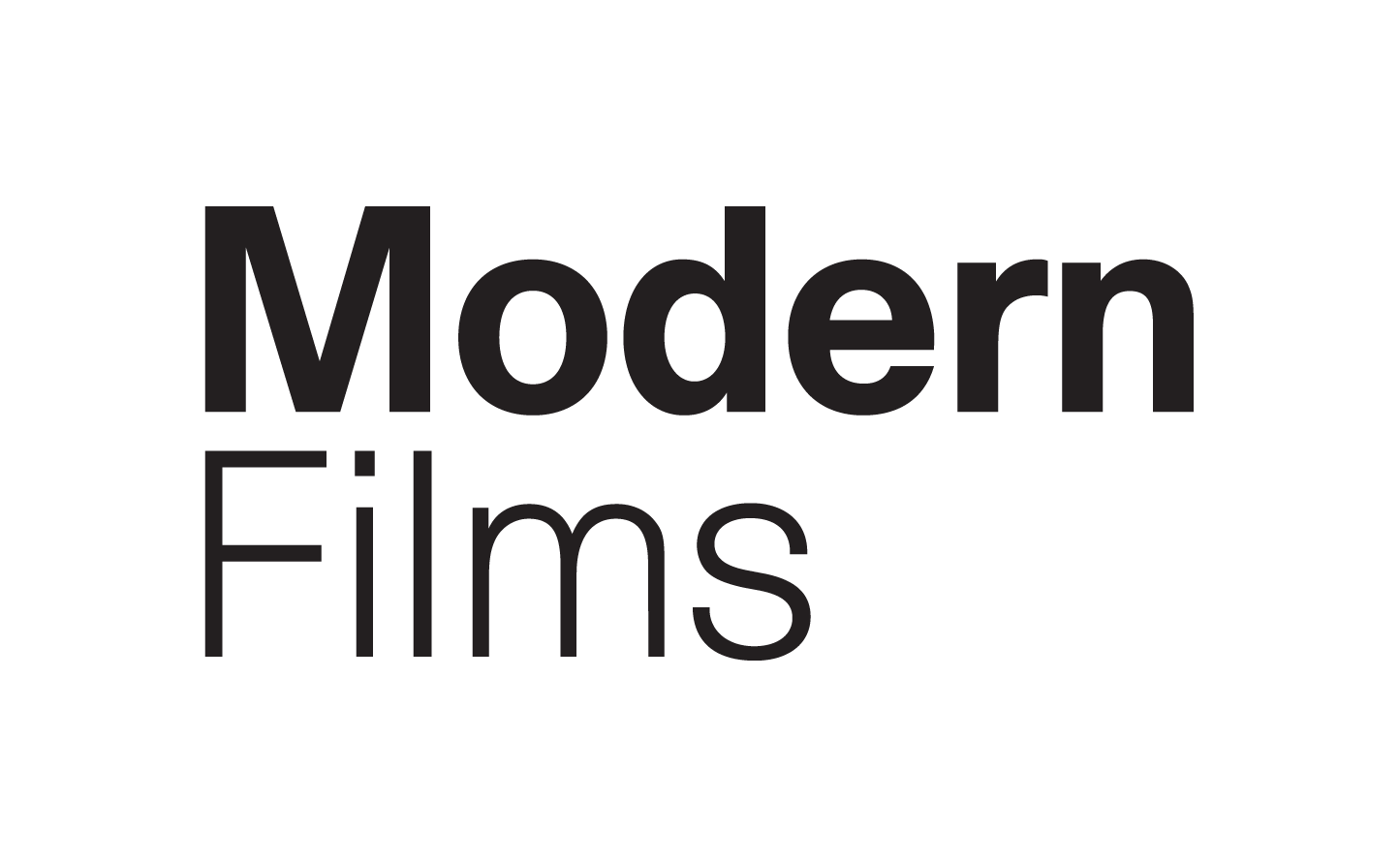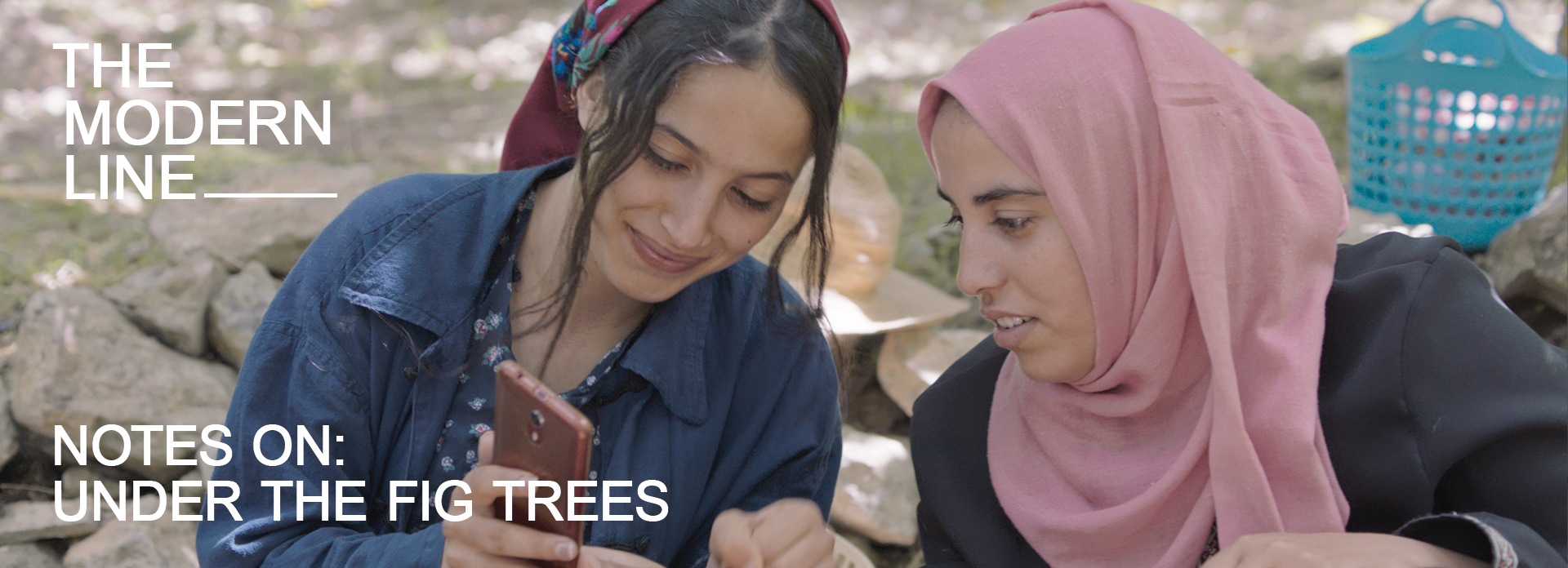Filmmaker Claire Belhassine chats to UNDER THE FIG TREES director Erige Sehiri in this episode of The Modern Line podcast. From the minutiae and poetics of daily work life, capturing sisterhood on screen and creating a film where one day would look like a lifetime, Claire and Erige discuss the making of Under The Fig Trees and the power of complexity within simplicity; of strength in the gentle and quietly political.
Listen to the podcast and take a browse through our notes on Under The Fig Trees below.

CLAIRE Did you always know the film was going to be one day, one location— this very particular way of approaching it?
ERIGE When I started the auditions I met Fide, who is one of the main characters of the film. She was picking cherries in an orchard at that time for work. And I went with her and I saw this orchard with those women and men, and it was like a frame, like a painting…but also like a frame in a cinema. And at that moment I thought that my whole film will happen in this frame. I was looking at them from afar and I started to imagine the stories, what they were talking about. And then I started to write Under the Fig Trees, and I knew that it was going to be one day that looks like a lifetime.
CLAIRE Can you talk a bit about your experience with documentary and the style and the approach that you've taken, which has quite a documentary feel about it? And also from Railway Men to this kind of obsession of the minutiae of how people work and the daily life of work. Why is that something that interests you?
ERIGE I'm still looking, I'm still trying to figure out why I'm always so attracted by the work gestures- the relationships between people in the workplace. I think we spend a lot of time at work. You share little moments of life and then you go back home. But those moments can be very strong or can tell a lot and I wanted to build that in this film. Not everything is told and not everything is seen. Also, I find the gesture of work very poetic, it tells a lot about society and relationship between women and men and the relationship with nature.

CLAIRE What I think is really strong about the film is the tension between this really lovely aesthetic which kind of seduces you with the light and the nature and the strong greens and these beautiful faces, beautiful skin— there's such an enormous warmth about it. And yet there's this kind of ominous feeling which is oppressive — you're contained and there's a feeling of wanting to break out, in a way. It's such a subtle feeling and quality about the film that is not overtly political… but it is. Did you start from there or did it emerge just from the conversation you started to build or have with these women?
ERIGE I know their life, and I know how much they are suffocating, how much they are frustrated about the economical and political situation. The lack of opportunities. So I thought that it would be interesting to use that statement in a way where I put the characters in an everyday situation, but where as an audience we could also feel trapped under those trees; with the beautiful light, in the beautiful environment. But still you can be trapped. And I think you can relate to that. No matter where you are in your life, you can relate to that feeling of having hopes and dreams or having all the capacity, all the talents… but still, it's not about wanting. In society we always say if you want something you can do it, but sometimes it's not just about wanting. Sometimes the situation where you are makes you limited. And that's the case of all the characters in the film. I think it was interesting to not just explain it through a cinematic decision or aspect, which is framing… but to have this sense.
CLAIRE I love this parallel with the older generation… It's really explicit, isn't it? To see the change right there with the difference between the generations.
ERIGE Yes. You just see it just in them being themselves. Without explaining to you what has changed after the revolution, without any spectacular scenes, but just by being themselves. And that was really important for me.
CLAIRE Yes. Even just a mention of WhatsApp or even though they're in the countryside and far away from a city. It's still a major method of communication and it's part of their life…
ERIGE And how modern they are. Yeah, I think it breaks a lot of cliches about women and the region, but also Muslim women, Arab women from the countryside. There's a lot of levels and it breaks all the cliches.
CLAIRE Even within the community disagreements. They don’t all think one way, or they might disagree with their friend. I think this is really interesting to see.
ERIGE And you also see that conservatism can come from younger women like Sana and not always from men. That's the idea of the film - to give a bit more complexity to society and different characters and mentalities. And that's how we work with the characters; the way they wear their scarf or the way they talk to girls, if it's a young man or older men, the way they talk to young women… where are they in terms of mentality, patriarchy, generation? And just by working together they have these small moments of talking.

CLAIRE Can you talk a bit about the transition from documentary to fiction? I think it's really interesting where there's crossover. How much did you let your actors improvise? How rigidly did you stick to your script? What was the push and pull of the freedom and the boundaries that was different for you?
ERIGE I think of course, fiction gives you more freedom. You can explore things differently. But the challenge here is that in a way, I was doing fiction, but I wanted to stick to reality. Which means I had to keep the tools of documentary. We were following the scenes of the day.
CLAIRE Some of the actors are quite young. Did they not change facially in the years of filming?
ERIGE I mean, I see the change, but I think it works with the film… because in every film, you want your character to be a bit different in the beginning than at the end. So if they look a bit tired, or their hair or skin changes, then it feels like the day has passed, but actually, in their life, a year has passed. But that's the film; the film is about one day that looks like a lifetime.







